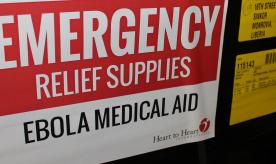The economic implications of Ebola on markets, traders and food security
Rachel Glennerster and Tavneet Suri have analysed the impact of the Ebola crisis on the functioning of agricultural markets in Sierra Leone. Several rounds of phone call-based market surveys have aimed to understand how commodity prices are shifting across different regions and how trading has been affected. The researchers partnered with Innovations for Poverty Action to collect multiple rounds of data on food availability, prices, and number of traders in 152 markets throughout Sierra Leone, with the initial round beginning the week of 19-27 August 2014. A second round of surveys of 157 markets was conducted during 11-16 September 2014 and included questions on petrol prices, the closure of markets, and food prices in Freetown markets. Subsequent rounds of phone calls with respondents (usually traders or market officials) at a representative random sample of 185 markets were conducted in early October, mid-November, and mid-December.
Due to the researchers’ long-standing engagement with markets in the country, they are able to compare responses to those collected from the same markets during those months in 2011 and 2012. In addition, they compare the cordon districts (Kailahun and Kenema) to the non-cordon districts to look at whether the cordon is impacting food availability and prices.
They have found that the number of traders selling basic food items has fallen significantly – by as much as 69% - in the cordoned districts of Kailahun and Kenema. Prices of rice have been relatively stable since 2012, but there remains a need to monitor prices and to target food where it is needed. Unseasonably heavy rains delayed the harvest, which must be taken into account when considering the impact of Ebola on agricultural production. Reduced domestic and international trade pose a significant threat to economic health in the affected countries.
Data on food prices from this survey are broadly consistent with results from a monitoring survey conducted by the WFP. Our results are consistent with emerging results from other surveys (including surveys of households) which suggest informal activity has been depressed by the Ebola outbreak but that food prices have not been impacted. Results have been shared with agencies including USAID, WFP, FAO, and DFID, and have helped to pinpoint markets experiencing price spikes to better target food aid.





